-
About
- Friday, May 17, 6 p.m.
- Saturday, May 18, 11 a.m.
Commencement
Celebrating the Class of 2024
About
-
Academics
- Friday, May 17, 6 p.m.
- Saturday, May 18, 11 a.m.
Commencement
Celebrating the Class of 2024
Academics
-
Admission & Financial Aid
- Friday, May 17, 6 p.m.
- Saturday, May 18, 11 a.m.
Commencement
Celebrating the Class of 2024
Admission & Financial Aid
-
Student Life
- Friday, May 17, 6 p.m.
- Saturday, May 18, 11 a.m.
Commencement
Celebrating the Class of 2024
Student Life
- Athletics
A man working in front of the computer
School of Management
March 2020
Execs weigh in on capstone projects
The finale of Associate Professor of Management Pamela Harper’s fall capstone class contained more than its share of drama. It’s hard enough to assemble a panel of executives to judge the presentations that students had spent the whole semester preparing, but a winter storm – one of only a handful that have hit Poughkeepsie this season – caused the event to be postponed, “wreaking havoc on executive schedules and complicating the event's agenda,” Harper says. “However, the executive reviewers made Herculean efforts to offer their support by changing their family plans, travelling for hours and even staying overnight in the Poughkeepsie area in order to participate.”
Despite the temporary delay, the student presentations “were a gratifying culmination to the semester’s scholarly work and research,” Harper says. “The seniors took full advantage of the opportunity to present the results of their hard work and analysis to such a distinguished panel of experts. This experience will serve as a source of inspiration for the students as they face challenges along the way to accomplishing great things.”
The professor offers congratulations to her students, and a heartfelt thank you to the executive reviewers:
• Tim Tenney, president and CEO, Pepsi Cola of the Hudson Valley; vice chair, Marist Board of Trustees
• Daniel Moran II ’03, senior director of operations – healthcare, Covanta; member, Marist Board of Trustees
• Rob Brown, area retail leader - Rockland Hudson Valley East, KeyBank
• Melaine Rottkamp, vice president, Dutchess Tourism, Inc.
• Geoffrey L. Brackett, executive vice president, chief strategy and innovation officer, Marist College
• Zac Grisham, assistant librarian, research services, Marist College
• Kuangnen Cheng, assistant professor of operations and supply chain management, Marist College
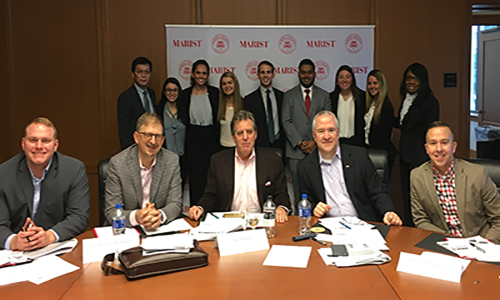
IN THE PHOTO (from left): Back row: Prof. Kuangnen Cheng; students Victoria Bova, Rachel Thayer, Ashley Jordan, Gabriel Sules, Ryan Mongroo, Stephanie Milazzo, and Lauren Drejza; Prof. Pamela Harper. Front row: Student Zachary Grisham; Geoffrey Brackett, Tim Tenney, Rob Brown, Daniel Moran II
Investor group discusses portfolio with Greystone students
Students in the Greystone Equity Fund class hosted a dinner meeting on Nov. 18 for the Fund of Poughkeepsie, a local investment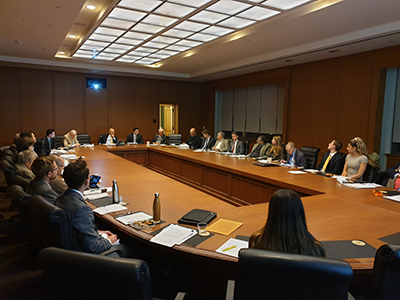
Hosting the event is “something we have been doing annually for the past five years,” says Associate Professor of Finance Brian Haughey, who teaches the class. “The students appreciate the opportunity to express their opinions on the fund’s current holdings.”
The fund, which has been in existence “for decades,” says Haughey, has a roster that includes two current members (John O'Shea and Steve Effron) and one former member (Lou Lewis) of the Marist Board of Trustees, “as well as others who have a long-standing relationship with the college,” Haughey adds.
Attending the meeting was “a very valuable experience,” says Andreas Perdios ’20. “I enjoyed listening to [fund members’] insights about the stocks they have in their portfolio; it was a good way to see how others make investment decisions.”
“The dinner was a good opportunity to practice public speaking skills outside of the classroom setting,” says Emily Kelly ’20. “I thought their investment strategy was interesting. I expected it to be focused on more stable stocks; ironically, the investors seemed to like volatility to generate returns.”
The dinner ended with fund members presenting Haughey with a donation to the college.
Accounting students introduced to professional organizations
Last fall, accounting students learned first-hand about several organizations that exert influence over accounting practices both nationally and internationally.
In October, the NYC Career Trek accounting track visited the headquarters of the American Institute of Certified Public Accountants (AICPA). Students heard the organization’s representatives explain the CPA exam process and the benefits of “This Way to the CPA,” a website containing information about the exam and state licensing requirements. In addition, participants learned about the Association of International Certified Professional Accountants. A conjoining of the AICPA and the Chartered Institute of Management Accountants, this organization provides CPAs and Chartered Global Management Accountants with “the resources and intelligence they need to clarify complexity, anticipate risk and create opportunity,” according to its mission statement.
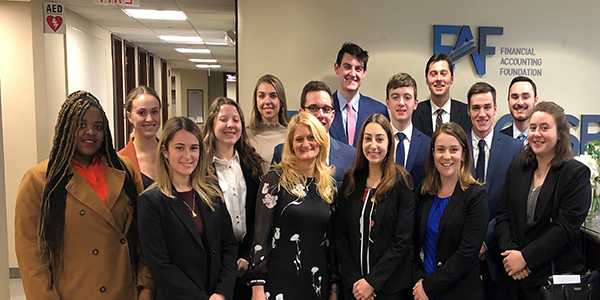
Back on campus, Paul Pacter, a former member of the International Accounting Standards Board, spoke to Prof. J. Donald Warren, Jr.’s Accounting Theory and Practice class. Pacter discussed the evolution of the IASB and its role in the development of International Financial Reporting Standards (IFRS); the benefits of global accounting standards; and the need for reduced IFRS for small and middle-sized entities.
The U.S. Securities and Exchange Commission’s R. Michael Willis spoke to members of Beta Alpha Psi and Prof. Warren’s Accounting Theory and Practice class. As assistant director of the Office of Structured Disclosure, Willis is responsible for leading the design and implementation of technological processes and tools to support the commission’s structured data needs. He discussed his duties, the SEC’s role in addressing structured data, and the XBRL taxonomy.
IN THE PHOTO: Lisa Valentini-Ghosh ’95 (center) with accounting students at the FASB/GASB headquarters
Kudos to BUS 100 competition winners
The winners of last semester’s BUS 100, Introduction to Business and Management business plan competition were honored at an awards luncheon held in the Cabaret in late November. Student teams were tasked with creating a business plan for a local not-for-profit company. The first-place team -- Brendan Carl ’21, Jeffrey FitzGerald ’23, James Fludgate ’23, Nicholas Rivera ’22 and Rex Rohde ’22 – were members of Prof. Peter Lai’s class. Taking second place were David Zung ’21, Kyron Thomas ’22, Tyler Vultaggio ’22, Daniel Simpson ’21 and Abel Simon ’21 from Prof. Debra Zambito’s class. Professor Erin McGuinness’s team of Howard Ng ’23, Artur Zinger ’22, Olivia Mack ’23, Kaylin Moss ’21, Gianni Berardinelli ’23 and Seamus Doyle ’22 finished third.
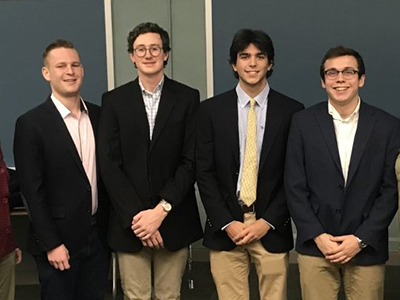
IN THE PHOTO (from left): First-place team members Rex Rohde ’22, Jeffrey FitzGerald ’23, James Fludgate ’23, and Brendan Carl ’21. Not shown: Nicholas Rivera ’22
Board of Advisors chair Stephen Cosgrove transitions to new role
After spending 15 years as a member of the School of Management’s Board of Advisors – the last seven of them as its chair -- Stephen Cosgrove stepped down from his position last fall after being elected to the Marist College Board of Trustees.
Cosgrove spent the lion’s share of his business career at Johnson & Johnson, retiring in 2015 as a vice president, corporate controller and chief accounting officer. His children Stephen Jr. and Kathleen are both Red Fox alumni, having graduated in 2007 and 2009, respectively; Stephen Jr. also earned a master’s degree from Marist in 2011. Cosgrove lives with his wife, Debby, in North Brunswick, New Jersey.
“Steve combines financial acumen and leadership skills with the unique perspective of being the parent of former Marist students,” says Dean Lawrence Singleton. “While we heartily congratulate him on his election to the Marist board, his knowledge and expertise will be sorely missed on the SoM Board of Advisors.”
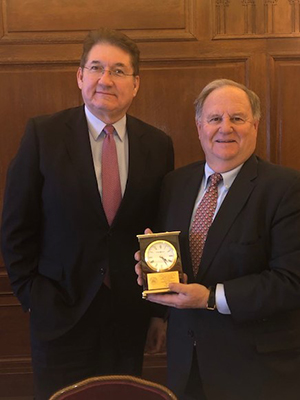
IN THE PHOTO: Dean Lawrence Singleton presents Stephen Cosgrove with a clock in recognition of his service on the SoM Board of Advisors at the organization’s Dec. 4 meeting
In the Hot Seat
When he’s home in the Bronx between semesters, SoM student Gabriel Bautiste ’21 – like millions of other Big Apple residents – rides the subway just about every day. As he boarded the D train last New Year’s Eve, he decided to ask his 40-some Twitter followers the following question: "All my New Yorkers, which is the best seat?"
“This question passes through my mind every day. I was curious to see if there was a strong favorite,” Bautiste said. “And out of nowhere, the whole city chimed in.”
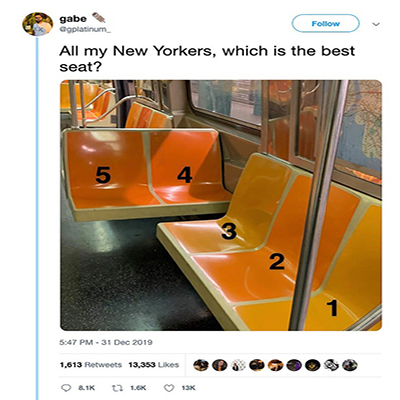
“The whole city” is no exaggeration: The tweet quickly went viral, striking a nerve with riders who debated the pros and cons (more legroom in seats 1 and 3, closer to the door in 4 and 5; no one seemed to prefer 2) of each location.
To date, the meme has been viewed by seven million people; both the New York Times and New York magazine published articles about it, and WABC-TV in New York ran a news segment featuring an on-camera interview with Bautiste. Among the local luminaries who weighed in on the commuting controversy: Current New York City Mayor Bill de Blasio (“1-2-3. 4 and 5 don’t exist when you’re 6’ 6”), along with former mayor – and former presidential candidate – Michael Bloomberg (“I always stand”). Transit riders in Toronto and Philadelphia began hashing out the question in their cities, and online jokes sprang up that asked viewers to pick the best seat on the Starship Enterprise and in the Seattle apartment of TV’s “Frasier.”
“The reaction is amazing,” says Bautiste, who currently is studying abroad at the University of Carlos III in Madrid. “I loved seeing the opinions of everyone, and I appreciated all the celebrity replies. Overall, it was cool to see that there isn’t a definitive answer.”
So Gabriel, which is the best seat? “Number 5 is my personal favorite. You can sit sideways, which allows for minimal interaction with the commotion that’s going on in the train.”
Faculty Focus
In February, a trio of SoM faculty members made presentations as part of the Emerging Leaders Program (ELP). On Feb. 10, Professor of Management and Associate Dean for Undergraduate Programs Joanne Gavin gave a talk entitled “Be Your Best from the Inside Out: Ethics and Leadership.” On the 14th, Assistant Professor of Management Melinda Weisberg discussed “Surviving Life in the Fast Lane: Leading and Managing Change.” Professor of Strategy Helen Rothberg encouraged students to “Play Nice and Share Your Toys” during her presentation on Feb. 24. ELP is a non-credit certificate program that affords students various ways to discover and hone their own leadership style. It was developed under the auspices of the National Society of Leadership and Success.
SoM professors John Finnigan, Xiaoli Wang and Feiqi Huang attended an IBM Blockchain Workshop in January. Hosted at the firm’s Thomas J. Watson Research Center in Yorktown Heights, NY, the five-day event was part of IBM’s “Train the Trainer” program. Consisting of lectures, lab exercises, and multiple group activities, the workshop focused on helping trainees understand how the use of blockchain technology is transforming industry. Technical topics – including cryptography and open-source technology such as Hyperledger Fabric – were discussed, and blockchain case studies and real-world solutions were presented.
The Public Company Accounting Oversight Board (PCAOB) establishes auditing and related professional practice standards for registered public accounting firms to follow when preparing and issuing audit reports. Among their duties, PCAOB inspectors assess compliance with Securities and Exchange Commission rules and evaluate a firm’s audit performance.
Assistant Professor of Accounting Zhaokai Yan is a member of the Rutgers Business School’s Continuous Auditing and Reporting Laboratory team, which is offering an Annual Inspections Training Course for approximately 150 PCAOB staffers. The course consists of three webinars (statistics, regression, and visualization) and two case studies; Yan is responsible for the regression webinar, which focuses on the applications predictive audit in practice; the statistical measures for associations between variables; application of multiple regression models in real-life datasets; and the use of regression models as part of audit procedures.
Alumni Profile: Johnnieanne Hansen
Johnnieanne Hansen MA ’15 is only half joking when she says that she spends her leisure time working. “In my spare time, I’m thinking about what we should be doing three months or a year from now -- which is lame, but I’ve just embraced it.”
Hansen is vice president of operations and workforce development at the Council of Industry, a trade association for Hudson Valley manufacturing firms located in Newburgh, NY. She earned her associate’s and bachelor’s degrees in business from SUNY Orange and Dominican College, respectively, and completed her master’s in integrated marketing communications at Marist in 2015. Hansen also is the executive director of the Hudson Valley Manufacturing Workforce Center (a sister organization of the Council of Industry that helps with workforce needs), an adjunct professor at SUNY New Paltz, and an active volunteer with organizations like Habitat for Humanity. She lives in Newburgh with her husband Stephen, daughter McKenna (a high school sophomore) and son Tanner, an eighth-grader.
Q: Would you give us a brief overview of your career?
A: Before coming to the Council of Industry, I worked in human resources, particularly in training and recruitment, at Walden Savings Bank. That set me up well for this opportunity, which I never expected would come to me. I focus on workforce development. It’s like human resources – I’m attracting, recruiting, retaining and preparing a team for the future -- but instead of doing it for 150 people at Walden Savings Bank, I do it hand-in-hand with 150 companies. I’m focused on bringing new people into this industry and creating awareness that jobs in manufacturing are diverse, well paid, and are right here in the Hudson Valley.
I also oversee a recruiting board. We have many small businesses with less than 50 employees, and it’s hard for them to compete in recruitment against larger companies. So they partner with us, and we provide them with the resources needed to fill their job openings at minimal cost.
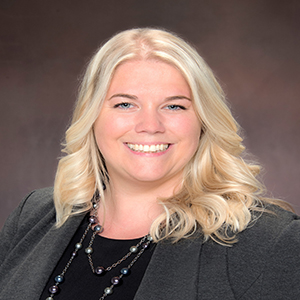
Q: In your opinion, what’s the biggest challenge facing Hudson Valley manufacturers today, and what can be done about it?
A: There are two things. One, technology is changing so fast. We’re fortunate that most of our manufacturers are high tech and working to keep up with the curve, but it requires a lot to do so. Second is the lack of people, which is a huge obstacle that’s keeping business owners up at night. We recognize that skilled workers are missing from the employment demographic right now, and we have to build that. Along with our apprenticeship program, we offer a certificate program in leadership for manufacturing and other training programs to help proven employees get the skills they need.
Q: Recently, you had a meeting with Dean Lawrence Singleton and other School of Management staff members. What did you discuss?
A: Marist College has such a successful NYC Career Trek; we talked about creating something similar in the Hudson Valley, and taking students to companies in the manufacturing sphere. These companies have accounting positions; they are looking for strategic thinkers and problem-solvers. Our idea was, wouldn’t it be nice to put 50 students on a bus and take them to see aerospace components that are being built at a company that’s 10 minutes from campus? Wouldn’t it be nice if they knew that these local jobs existed? (Editor’s note: The first Hudson Valley Career Day is scheduled for Wednesday, April 22. Organized in partnership with the Council of Industry, the event will take undergraduate business students for site visits at several local companies to talk with executives and learn about internships and entry-level positions.)
Q: What “soft” skills are most important for students to develop?
A: I think students are used to being so competitive in the classroom that they are afraid to be vulnerable. It’s a hard transition into an environment where you’re not supposed to know everything. In the workforce, being willing to say “I don’t know” and ask for help makes a difference.
Q: What aspect of your work life do you enjoy the most?
A: I believe we are genuinely helping people and making a difference in their lives. The flip side of that is we don’t have the capacity to help the number of people we would like to, and that feels heavy. But I just love the little win, when I can help just one person go into an internship program that I know will change their life.
Getting to know…Prof. Tony Carrizales
Tony J. Carrizales, an associate professor of public administration, came to the School of Management in 2006. “My academic life was pretty straightforward,” says the Brownsville, Texas native. “I had never heard of schools on the East Coast. But when I was a high school senior, some students came and made a presentation. My counselor suggested they speak to me, and they convinced me to write an application to Cornell. I got in, and have been on the East Coast ever since.”
After earning his BA and MPA at Cornell, Carrizales headed to New Jersey to complete his doctorate. While working on his 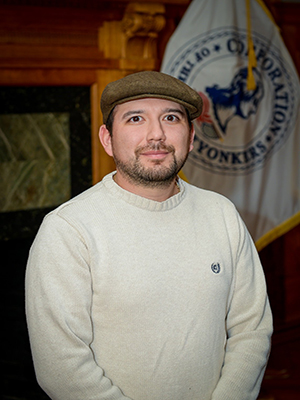
The professor admits that becoming an academic was not his original career goal. “As a kid, I had dreams of being a professional athlete,” he laughs, “but the reality kicked in real quick, and I had to find something else. My mom was an academic, so I had an appreciation for higher education. I have really come to enjoy teaching, and I still get to do research and travel. One of the things I like about Marist is the opportunity to teach in Florence, which I’ve done three times.”
Currently, Carrizales’ main research interest is cultural competence. “Organizations in the public sector especially can be more effective in diverse communities when they are competent about their residents’ languages and customs. When they engage with the residents, they understand that there are differences.”
He also played a large part in the development of the SoM faculty’s RATE (Research and Teaching Excellence) mentorship program. “When I got here,” he remembers, “we weren’t assigned mentors. I realized it was good to have a point of contact, someone who can answer questions about living in the area, the promotion/tenure process, etc. So part of the RATE program is having an assigned mentor, which is what I do – match people up.”
Carrizales and his wife, Michelle, live in Yonkers, NY with their three children: Oliver, eight, and five-year-old twins Claudia and Warren. Leisure time, he says, is “defined by the kids,” with video games being a popular pastime: “We play as a team against other players,” he says, “and it gets pretty intense.” Giving back to the community is also paramount: He is the board president of Cluster Community Services, which provides mental health, housing, and after-school programs in Westchester and Rockland counties. “And I do a lot work with the Freemasons,” he adds.
Carrizales credits his mother with instilling in him the importance of community service. “Growing up in South Texas in the 1980s, we saw lots of immigrants from Central America, who would walk for miles and miles to get to Brownsville. My mom was in the medical area; she would take me to a temporary shelter for immigrants where she would treat their feet, and I would play with the kids.
“The experience ingrained in my mind that you have to provide service and be engaged in your community. It helps define what kind of person you’ll be.”
